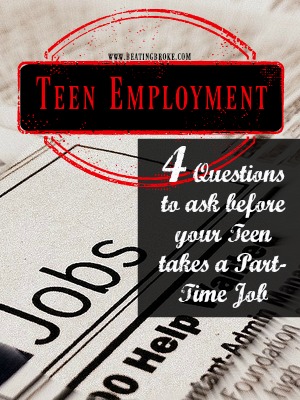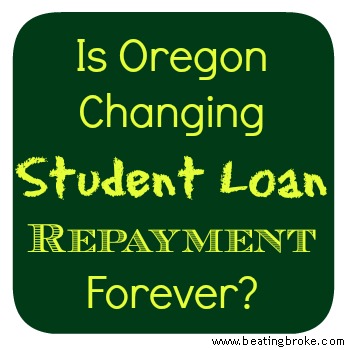Working part-time is a rite of passage for many teens. Teen employment can lead to increased independence—new friends at work, extra spending money, money to save, etc. However, teens should think carefully before applying for and taking a job. Ideally, they won’t just by default apply to the local restaurant or fast food restaurant. Instead, they should choose a job that matches their goals and aspirations, if possible.
Before the job search begins, you and your teen should consider these questions:

What is your teen’s interest? What is your child interested in and good at? What kind of job could he do that he would enjoy and that wouldn’t feel like a grind after a few months? If he loves animals, maybe he could consider working at a pet store or a dog groomers.
What career is your teen considering? If your child is a junior or senior in high school, she likely has a career choice in mind. If she’s choosing between several, now is the time to learn more and help her narrow down her choices.
When I was a senior, I worked at a vet clinic. I had the opportunity to work with the animals and even observe surgeries. I had been toying with the idea of being a veterinarian, but after a summer at the job, I decided I didn’t want to invest all of the time and money it took to become a vet. The job just wasn’t one I’d enjoy that much.
Ideally, your child’s job can help them discern if this is the right career path for them. If it’s not, you and your child have saved thousands on an education they might not have used in the future.
What is your teen’s temperament? How does your child do under pressure? Is he introverted or extroverted? Jobs available to teens can vary widely. Some jobs will have them interacting with the public regularly while others will not. Choose the job that best fits his temperament.
However, sometimes a good job that doesn’t perfectly fit your child’s temperament can provide learning opportunities, so also consider that a stretch in comfort level isn’t all bad.
Will this job help your child get into college or get a job in his career field? Ultimately, a job should not just give your teen some spending money but also help her get into college or into her career field. The jobs that teens take should be stepping stones into the life that they see for themselves.
Also, don’t be afraid to end the job if it is distracting your child from his ultimate goals. Too often, teens take what looks to be a good job only to be given more work hours than they can handle, which causes their schoolwork to suffer. Getting experience in their chosen field IS important and can help them get a better job later in life, but they also must focus on their studies.
Did you have a job as a teen that helped open doors for you or helped you choose your career field, or did you simply work whatever job was available?
Melissa is a writer and virtual assistant. She earned her Master’s from Southern Illinois University, and her Bachelor’s in English from the University of Michigan. When she’s not working, you can find her homeschooling her kids, reading a good book, or cooking. She resides in New York, where she loves the natural beauty of the area.



